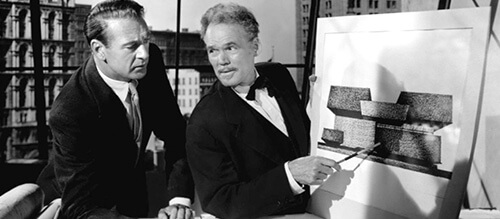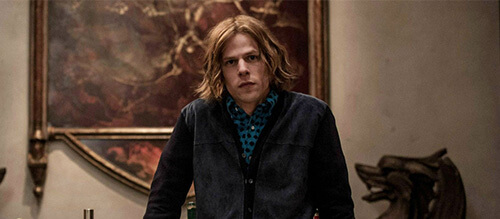The Man of Rearden Steel: Objectivism in Contemporary Cinema
During a conversation with my colleague Katie Doyle, I discovered something that I feel like I should have known; Zack Snyder’s next project is re-making Ayn Rand’s The Fountainhead. While I mentioned Snyder’s Batman v Superman: Dawn of Justice‘s Randian leanings in part two of my BvS series, I felt I had done a disservice to the audience by not elaborating further, hence this article…
Ayn Rand is known for developing the philosophy of Objectivism. For the uninitiated, Objectivism is founded on the principles of reason as the ultimate tool for discernment, and rational self-interest as the basis for a moral system. Rand’s ideas were formed as an antithesis to Communism; Rand was born in pre-Soviet Russia, and was twelve at the time of the revolution, so it’s easy to understand how someone in her place became so opposed to Communist ideology. Her family faced terrible conditions and she was kicked out of university for her bourgeois background (though she was readmitted and allowed to graduate).
Like many abused by a system, she over-corrected, and her philosophy of self-interest became bizarro communism; private property is exalted above all, the individual’s needs are of the utmost importance, and she saw everyone in society as either a “creator” or “parasite”. Her fiction is almost required reading to be a Republican; I think every member of Donald Trump’s cabinet is a Rand fan. While her ideals regarding reason and individualism have merit, it’s undeniable that her brand of selfishness appeals to a certain kind of person; the kind who would describe everyone accepting social welfare as leeches, or those who simply don’t like paying taxes and want pseudo-intellectual justification. Like most Utopian ideas, her principles are only practical in the shadows of Plato’s Cave.
In his play Mozart Was a Red, Murray Rothbard (a contemporary of Rand’s who was briefly in her inner circle) demonstrates the folly of Rand’s philosophy. Making every action and thought objective discounts the fact that humans are emotional and nuanced creatures. After Rothbard’s analogue refuses a cigarette (he says he doesn’t like to smoke) Carson Sand (Rothbard’s representation of Rand) chastises him for being a slave to his feelings, espousing that it’s rational to smoke because, “smoking is a symbol of the fire in the mind, the fire of ideas. He who refuses to smoke is therefore an enemy of ideas and the mind”. It’s clear to anyone reading this in the 21st century that smoking isn’t reasonable at all, thus displaying the absurdity of expecting pure reasonable thought or action.
The Fountainhead (1949)
Rand’s breakthrough novel, “The Fountainhead”, was adapted to the screen by Rand herself in conjunction with director King Vidor. Released in 1949 and starring Gary Cooper and Patricia Neal, the film is basically two hours of philosophical diatribes lacking any pretext of subtlety. The plot: an architect named Howard Roark desires nothing but to do his work on his terms. He’s an uncompromising visionary, but he is completely lacking in personality. He’s stoic and emotionless; Rand’s ideal man. His refusal to design buildings that are not wholly original leads to controversy; critic Ellsworth Toohey hates Roark’s modern style that refuses to conform to collective preference (we all know how today’s Randians are typically huge fans of progress and definitely aren’t mostly conservatives concerned with romanticizing the past), and conspires to destroy him. Roark’s inferior colleague, Peter Keating, mooches off of the protagonist’s genius when not bending to the whims of public opinion. He asks Roark to design public housing to pass off as his own. Roark does so, but only if the design will remain unaltered. When the design is inevitably altered, Roark blows up the building (this is the good guy!). He’s arrested and tried, but ultimately acquitted because he makes a speech about how uncompromising and individualistic he is (though he does admit to the crime). The entire scene is more like Camusian absurdism than a work of idealized fiction. It’s ironic that someone so devoted to reason writes an entirely nonsensical ending.
When Snyder’s superhero epic is viewed through the lens of Randian fiction, everything begins to make sense. Why Batman is kind of a bad guy, why Superman isn’t heroic, and why characters are so preachy with their dialogue. Audiences watching his films must keep in mind that reason and self-interest are the ultimate virtues while emotion and charity are equatable to sins (Roark states that charity is slavery in the film, something only the most heartless and sociopathic individual could agree with).
I’ll begin with Batman. I have argued that Batman is the most identifiable character in BvS, and stated that I actively root for him through every rewatch. Batman sees Superman as an existential threat, and it’s hard to blame him when we see how excessive the destruction of Metropolis was. However, Rand (and Snyder, I suppose) would view Batman as a character driven by emotion. He seethes with rage, and we hear Alfred monologue about hate and anger turning good men cruel. Batman dispenses justice the wrong way because of his emotion. Batman could also be similar to Gail Wynand, a media mogul in The Fountainhead. Wynand is a symbol for wasted potential. He built himself from nothing, but he did it through conformity and public opinion. Batman had the potential to be a vigilante who only uses reason to justify violating the individualism of criminals, but he’s too busy being incensed by sex traffickers to realize that his work protecting Gotham is needless charity to the unseen leeches of society who do not deserve his help.
Jesse Eisenberg as Lex Luthor in Batman v Superman (2016)
Lex Luthor could not more clearly be Ellsworth Toohey. The entire film is about his grand conspiracy to bring down Superman. Luthor attempts to use the government to acquire kryptonite for a weapon, and also orchestrates events to weaponize public opinion against Superman. This is a parallel to Toohey’s campaign in the press against Roark; he conspires with Wynand to run articles in Wynand’s paper about how a building of Roark’s is unsightly, even unsafe (with no evidence). When that fails, Toohey continually works to sabotage Roark any way he can, for the mere fact that Roark is an individualist. Luthor is also governed by emotion; he is often erratic in his behavior and overreacts when slighted. Like Toohey, he seeks power over others, something said to be wrong in The Fountainhead (we know that because the bad guy wants power. I use “said” because it’s never demonstrated why it’s wrong, though I suppose one could argue it’s because those in power are then subjected to the will of the mob and would cease to act out of self-interest). Lex Luthor is almost an exact replica of Toohey in content of character, and I found myself sympathizing with each a bit, if only because the respective protagonists are so insufferable.
We finally reach the enigma that is Superman. I have long been confused how anyone thought this portrayal of Superman was a good idea. He’s almost nothing like classical portrayals (yes, I see that I’m essentially criticizing Snyder for not conforming, but there’s irony in an admirer of Randian ethics creating work based on someone else’s intellectual property so let’s call it even). This Superman is just so unlikable. I can’t fathom why anyone thought turning Howard Roark into a literal super man would be a good idea. Snyder’s Supes shares Roark’s expressionless, reasonable demeanor, and like Roark will not give or ask for help. Clark Kent doesn’t watch the news because he doesn’t care about public opinion. Clark Kent isn’t aware of Bruce Wayne because concerning yourself with celebrities has no value or benefit to the self. Clark Kent reports on Batman’s injustice because there’s good reason, not because he hates Batman. In every scene where Clark is pitching to Perry, Clark is calm and maintains an air of moral superiority because of his rationality alone. Superman would never use his powers to help people when they ask; this Superman wouldn’t want to use his ability without a self-interested justification, would he? When there’s a montage of Superman saving people, his expression is sad because he knows what he is doing is ultimately unhelpful because those lecherous flood victims and holiday celebrants will never learn to be self-reliant. He’s the good guy of the film because of the values he supposedly embodies, and not because of widely accepted moral actions. If I may again appeal to the collective understanding of heroism, it typically involves a level of selflessness and self-sacrifice, something Snyder seems to realize by the end of the film.
One thing I cannot figure out is the overt religiosity of Snyder’s film. Rand was an ardent atheist, and objectivism is based within a materialistic worldview. To quote Rand, “Man exists for his own sake, that the pursuit of his own happiness is his higher moral purpose, that he must not sacrifice himself to others.” Snyder’s Superman isn’t just Howard Roark, he’s also Jesus. The entire point of Jesus’ story is the ultimate self-sacrifice for the sins of the world. Objectivism is diametrically opposed to Christianity because selflessness is the ultimate goal of Christianity. Though I have seen some argue that the Bible and The Fountainhead can be squared, inviting faith and the supernatural into Rand’s philosophy is an affront to the basis of that philosophy.
The government of BvS also makes more sense with a proper understanding of Rand. Senator Finch doesn’t particularly like Superman, but her role is that of non-intervention unless someone’s private property or capital is under attack. The government cannot deter Superman because that would violate Superman’s individual rights to life, liberty and the pursuit of happiness. The government is weak because that’s the government of the laissez-faire capitalist system Rand promoted.
This is the breakthrough I’ve been searching for. So much of Batman v Superman makes absolutely no sense if you are looking at it as if it is normal fiction from people with a more traditional moral philosophy that calls kindness a virtue (for a humorous look at such philosophies contrasted with objectivism, see this comic). Once I put more thought and research into Rand’s (and Snyder’s) philosophy, characterization began to make sense. These aren’t traditional superheroes; these are symbols in a delusional morality play. If Howard Roark is the ideal man, I guess I’ll settle for being a derivative conformist hack.
Author’s Note: Before any objectivists draw an Ellsworth Toohey comparison, I want to be clear; I have written this essay of my own volition and not for a collective mass of Ayn Rand detractors, though I don’t see that as a value unto itself. I write based on my own set objective standards and out of my own self-interest, rendering your opinion invalid. Your thoughts on my critique are of no consequence to me, an individual with a semblance of a conscience and an awareness of the limitations of reality. I will not conform my ideas to your narrow view of the world; where art only has value if it’s wholly original and helping others is vice. I shamelessly acknowledge that this essay is a synthesis of ideas because to assert otherwise is the height of arrogance.
[DISPLAY_ULTIMATE_SOCIAL_ICONS]



